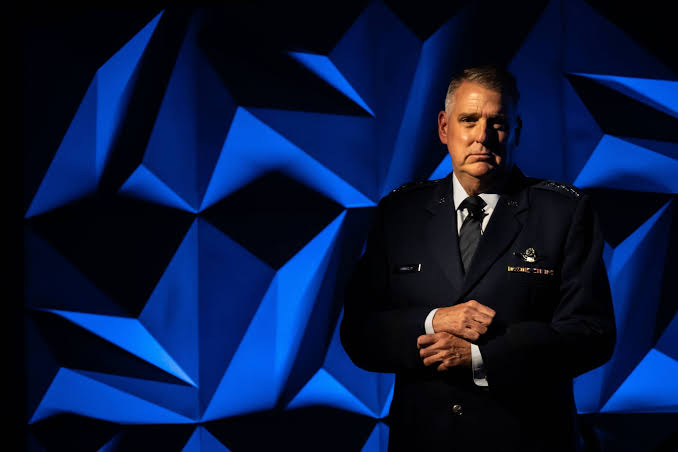U.S. four-star general warns of war with China by 2025
By Jesse Johnson

The U.S. Air Force’s Air Mobility Command chief, Gen. Mike Minihan, speaks during the Airlift/Tanker Association Symposium in Denver last October. | U.S. AIR FORCE
A four-star general in the U.S. Air Force has warned of war with China within the next two years, likely over self-ruled Taiwan, in remarks that the Pentagon quickly sought to distance itself from.
Gen. Mike Minihan, who heads the U.S. Air Mobility Command, warned in a letter to the leadership of its roughly 110,000 personnel that it must speed up preparations for a looming conflict, citing Chinese President Xi Jinping’s goals and the possibility that Washington and Taipei will be preoccupied with other domestic issues in the ensuing two years.
“I hope I am wrong,” Minihan wrote in the letter dated Feb. 1 but sent out Friday. “My gut tells me we will fight in 2025. Xi secured his third term and set his war council in October 2022. Taiwan’s presidential elections are in 2024 and will offer Xi a reason. United States’ presidential elections are in 2024 and will offer Xi a distracted America. Xi’s team, reason, and opportunity are all aligned for 2025.”
The Defense Department looked to distance itself from the letter, with a defense official telling The Japan Times that the comments “are not representative of the department’s view on China.”
Still, while the letter did not represent the views of the Pentagon, it did highlight what appears to be growing concern among senior officers in the U.S. military and lawmakers over a possible invasion or attack on democratic Taiwan by China.
“If we’ve learned anything from Ukraine, it’s that we need to take our adversaries at their word when they threaten their neighbors and put hard power in their way before it’s too late,” Rep. Mike Gallagher, who heads a House select committee that will assess the military, economic and technological challenges posed by China, said in a statement.
“General Minihan should be commended for directing his Airmen to take the threat seriously,” he added.
Tensions over Taiwan — which China considers a renegade province that must be brought back into the fold, by force if necessary — hit fresh highs last year, as Beijing conducted massive military exercises after a high-profile visit to the island by then-U.S. House Speaker Nancy Pelosi.
China has continued what the Pentagon calls “provocative” moves near Taiwan this year, including a large-scale “combat” drill around the island.
Fears of a conflict between the two powers hit a fresh high in 2021, when Adm. Philip Davidson, then head of the U.S. military’s Indo-Pacific Command, caused a stir by spelling out a timeline for a potential conflict in the Taiwan Strait.
“I think the threat is manifest during this decade, in fact, in the next six years,” Davidson said in testimony before the U.S. Senate’s Armed Services Committee.
Davidson noted in a recent interview that his 2027 assessment could include assaults on small, outlying islands held by Taipei, an overlooked potential flash point.
In recent months, there have been indications that Davidson’s view, which was partially downplayed at the time, has taken on more resonance among American officials.
In October, the head of the U.S. Navy warned that the military must be prepared for the possibility of a Chinese invasion of Taiwan before 2024. Days earlier, U.S. Secretary of State Antony Blinken said Beijing was “determined to pursue” unification on a “much faster timeline” after deciding that the status quo over Taiwan was “no longer acceptable.”
U.S. Defense Secretary Lloyd Austin has sought to dampen fears of a looming conflict with Beijing after Washington identified China as its top security challenge.
“We believe that they endeavor to establish a new normal, but whether or not that means that an invasion is imminent, I seriously doubt that,” Austin said earlier this month after so-called two-plus-two talks in Washington involving himself, Blinken and their Japanese counterparts.
In a response to a request for comment on Minihan’s memo, first reported by NBC News, Pentagon spokesman Brig. Gen. Patrick Ryder called China the Defense Department’s “pacing challenge,” adding that “our focus remains on working alongside allies and partners to preserve a peaceful, free and open Indo-Pacific.”



